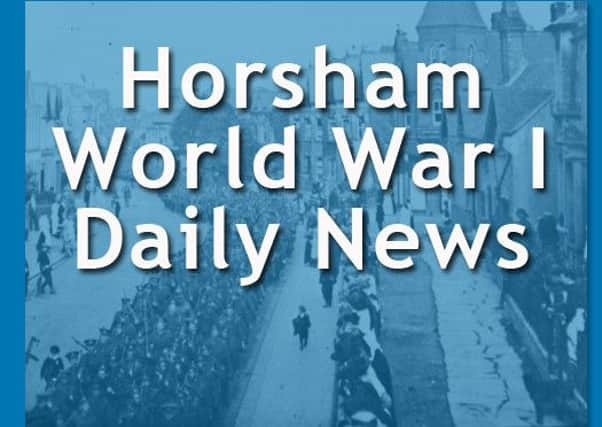Horsham’s wartime Christmas in 1914


By December 1914 Horsham had like the rest of the nation become accustomed to war with the realisation that it won’t be over by Christmas.
The last four months had seen Horsham immersed in the war, a war that the country had been ill prepared for, so there was a great deal of negotiation, public debate and establishment of new organisations which used the skills of the voluntary sector.
Advertisement
Hide AdAdvertisement
Hide AdIt was in many respects a challenge that the middle classes “stepped up to” and took on.
Christmas 1914 has become part of World War One legend with its game of football across the trenches.
In Horsham the town held a Christmas entertainment for the Belgian refugees in the Albion Hall.
The hall was decorated with flags and long festoons sent by the Horsham Cricket week decoration Committee.
Advertisement
Hide AdAdvertisement
Hide AdThere were about 150 people in attendance with the Belgian refugees being delivered to the hall by motor car from Albert Lodge and No 22 The Carfax.
By February 1917 there were still nine at Albert Lodge and a family of five children and a mother being looked after by the Roman catholic Father Cassidy.
One of the key reasons for entering the war was the invasion of little Belgium.
Newspapers and magazines of the day constantly commented on German brutality to Belgians. One would expect that the local authorities would be in sympathy with any appeal.
But as Jane Bowen found out this was far from the case.
Advertisement
Hide AdAdvertisement
Hide Ad“Southern England received the main impact of the refugee problem as the majority of Belgians arrived in Folkstone.
“Horsham does not appear to have been inundated, but even so officialdom - the Horsham Urban District Council and the Hospital - refused requests to help - and it was individuals who made accommodation available as and when necessary.
“Two houses were lent for refugees, one at 22 Carfax, and the other, Albert Lodge Kings road.
“The H.U.D.C. relented enough to remit rents and rates on these houses (as they had for WSD), but the families were maintained by local funds and contributions in kind.
Advertisement
Hide AdAdvertisement
Hide Ad“In 1915 there were ten Belgians in the Carfax, with two families and two nuns, by 1918 only two women and three small children were left; they moved to 22 Carfax, and then returned to Belgium.”
The authorities did though allow extensive fund raising.
One of the notable events of Christmas 1914 was the death of Mr. Charles Cyril Eversfield, the owner of Denne Park House, whose death at the age of 42 saw the estate pass out of the direct family to distant cousins who had, in order to inherit, to change their name to Eversfield.
The new owners became Bethune Eversfield, thus ending 300 years of direct family control of what was one of Horsham’s most important estates, a family who had become involved in the town 200 years earlier when they entered the murky world of 18th century political fray and then around 50 years ago when they built the chapel in Denne Road.
Charles left unsettled property of £17,291 as well as dog kennels for which he was well known.
Advertisement
Hide AdAdvertisement
Hide AdHorsham at this time was still acting as a second home for the County Council and its various committees.
On the 31 December 1914 in Horsham the Higher Education Sub Committee recommended that West Sussex County Council seek a loan from the Local Government Board of £9,360 to build, equip, employ a clerk of works and lay out the grounds of a new High School for Girls in the town.
As early as the 10 December the Governors of the Pupil Teacher Centre for Girls in Horsham had approved the scheme, so it was making its way through the various committees, until it was adopted without discussion by the West Sussex County Council’s Education Committee.
Horsham was going to have a High School for Girls, which would house about 150 pupils.
Advertisement
Hide AdAdvertisement
Hide AdExcept it didn’t happen, for the same Education Committee agreed to give the 4th (Reserve) Battalion Royal Sussex Regiment the land in Hurst Road, set aside for the school, as a football pitch.
Probably the expectation was that the war would soon be over and work could start, but it wasn’t to be. Horsham High School for Girls would have to wait as the plans and development became swamped by the war effort.